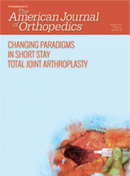Changing Paradigms in Short Stay Total Joint Arthroplasty
Giles R. Scuderi, MD; Michael A. Kelly, MD; Fred D. Cushner, MD; John W. Barrington, MD; Robert E. Booth, Jr, MD
In this valuable resource, experts offer insights on evolving strategies for managing perioperative pain in patients who undergo total joint arthroplasty. Concise discussions focus on the challenges of perioperative pain management, how current pain management protocols are contributing to the US opioid epidemic, the changing roles for regional analgesia and peripheral blocks, efficacy of periarticular injection with a long-acting local analgesic in joint arthroplasty, closing analgesic gaps in postsurgical pain management, outpatient joint arthroscopy programs, and approaches to improving the efficiency of joint arthroplasty and reducing length of hospital stay.

